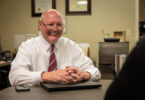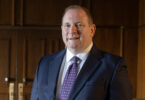
by Jenifer Valenti
As the director of the office for protection and care and formerly the ombudsman serving the Diocese of Kansas City-St. Joseph, I have been working in the ministry of church abuse for well over a decade. Although I have experience addressing victim crimes as a former prosecutor, I have learned so much from this ministry.
The church’s prevention efforts over the last 20 years, along with society’s better understanding and response to sexual abuse, has significantly decreased its occurrence. It takes every single one of us to create a strong safety net of protection. We are grateful to all of you who have done your part to strengthen our awareness and prevention efforts.
The office for protection and care ministry includes both abuse prevention and also the response to sexual abuse, caring for abuse victims that are harmed by someone in a position of trust in the church. Our team is responsible for responding to abuse by conducting investigations as well as accompanying victims in their journeys of healing. I have seen the wounds caused by the abuse, but it has been especially painful to witness the devastation caused when our response to a victim’s disclosure fails to live up to our Catholic values.
Several years ago, I resolved to help the church take a different approach to responding to abuse, an approach based on restorative principles. Restorative principles recognize that humans are fundamentally relational, and church sexual abuse creates harm in a variety of relationships. According to these principles, anytime harm is caused, it creates needs in those who have been hurt and it creates the obligation by the person or institution that caused the harm, to work to make it right.
I wish we could turn back time and stop past abuse, but since we cannot do that, we must, as a church, work to meet the needs that have arisen out of that harm. Often, sexual abuse steals dignity and control and creates profound feelings of shame, denial, anger, depression, shattering trust. Restorative practices are designed to empower the victim and support them on a healing path while aiming for true accountability.
I often hear well-meaning people assert that this is a church problem of the past. While our prevention efforts have made great strides, the wounds from the abuse and, oftentimes, the church response to that abuse, remain. Trust has been broken.
Our team strives to serve this important ministry with humility and grace, recognizing we have lots more to do and learn. If you or someone you know has been sexually abused by a cleric, employee or volunteer of the archdiocese, it would be our honor to visit with you in the hopes we can work to atone for those sins.






